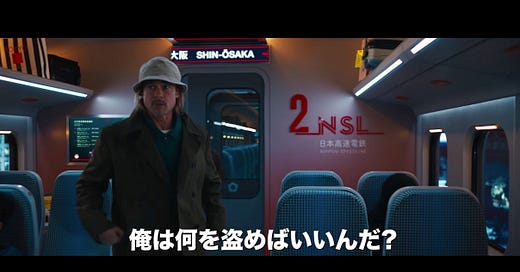THB #196: Bullet Train (spoiler-free)
There are multiple ways to focus on Bullet Train.
You can take it as a wild ride… a live-action anime, in which you just enjoy each segment of the journey for all its worth, not seeking real connectivity. (I know that some will see this as an insult to anime, but bear with me, please.)
You can take it as a mixture of Hitchcock and Buster Keaton, in which a man has a clear desire that will be challenged over and over by the choices of others, which perhaps have more to do with him than he understands.
You can take it as a new variation on Tarantino’s new variations of kill movies - as seen in the Kill Bills, which was shot to be one movie (like Wicked) and broken up for financial reasons - with one central figure with a deadly, but surprisingly positive goal, challenged by character after character, all of whom are connected… and not.
Or you can film critic it, which is definitely one of my instincts, and ask for it to be more than the sum of its parts, while appreciating the parts along …
Keep reading with a 7-day free trial
Subscribe to The Hot Button by David Poland to keep reading this post and get 7 days of free access to the full post archives.




